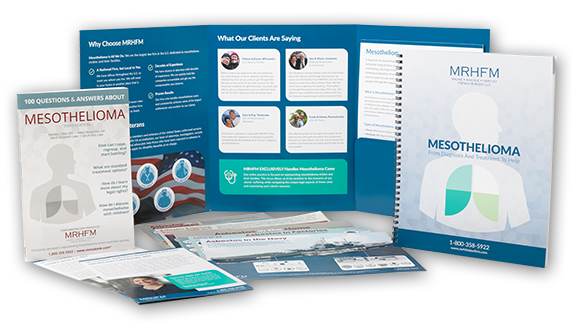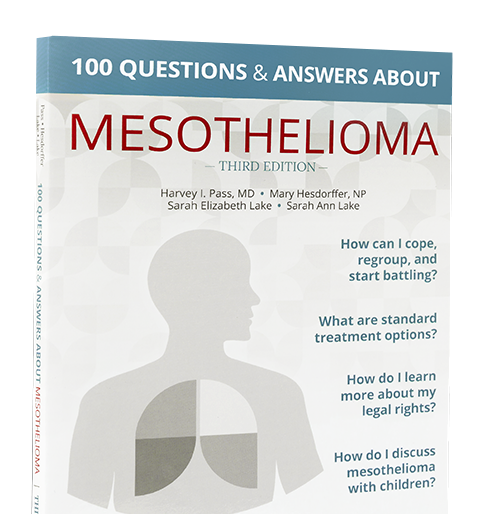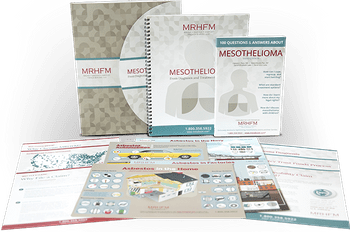Early detection of mesothelioma is now possible with certain blood tests that are used to discover mesothelioma in people who have been exposed to asbestos. These distinctive tests work by helping identify elevated biomarkers, which are molecules that indicate normal or abnormal processes taking place in your body. Per Caris Life Sciences, “various types of molecules, such as DNA (genes), proteins or hormones, can serve as biomarkers since they all indicate something about your health. Biomarkers may be produced by the cancer tissue itself or by other cells in the body in response to cancer.”
Several blood tests show promise in helping detect mesothelioma cancer before it advances into the late stages. These tests help detect elevated blood levels of substances such as fibulib-3, osteopontin, and soluble mesothelin-related peptides (SMRPs). These substances make mesothelioma more likely. Some of the most promising blood tests for mesothelioma are:
-MESOMARK
-Human MPF Elisa Kit
-Fibulin-3 Test
-SOMAmer
MESOMARK is the world’s first serum-based biomarker sensitive for mesothelioma. Developed by Fujirebio Diagnostics, Inc., the blood test measures the amount of Soluble Mesothelin-Related Peptides (SMRP) present in the bloodstream. Per Fujirebio, this test can help physicians “routinely monitor individuals with the greatest risk of developing mesothelioma due to asbestos exposure.” If mesothelioma develops, doctors can use the test to help determine how well patient’s respond to treatment.
Human MPF Elisa Kit measures megakaryocyte potentiating factor (MPF), which is a protein encoded in the mesothelin (MSLN) gene.
Fibulin-3 Test is a new biomarker for malignant mesothelioma (MM). Research shows that testing this biomarker could assist in early detection of malignant mesothelioma. In studies, the test was also effective in detecting the progression of mesothelioma.
SOMAmer (Slow Off-rate Modified Aptamer) was shown to have “excellent” diagnostic accuracy in case-control settings. The test measures a panel of 13 biomarkers to detect mesothelioma.
Other tests that may be useful include CA-125 (CTCA), which could help detect more than a dozen types of cancer, including peritoneal mesothelioma, and 8-hydroxy-2′-deoxyguanosine (8OHdG), which has been used to estimate the DNA damage in humans after exposure to cancer-causing agents, such as asbestos fibers, tobacco smoke, heavy metals, and polycyclic aromatic hydrocarbons. Interleukine-6 (IL-6), osteopontin, and vascular endothelial growth factor-beta (VEGF-B) are other options.
If you have been exposed to asbestos, talk to your doctor about the different types of blood tests for mesothelioma. Remember, early detection could save your life.
Sources
Agha, Mohammed A., Mahmoud M. El-Habashy, and Rania A. El-Shazly. "Role of Fibulin-3 in the Diagnosis of Malignant Mesothelioma." Elsevier.com, Sciencedirect.com. The Egyptian Society of Chest Diseases and Tuberculosis, 22 Oct. 2013. Web. 23 May 2017.
Bradshaw, Michael, Aaron Mansfield, and Tobias Peikert. "The Role of Vascular Endothelial Growth Factor in the Pathogenesis, Diagnosis and Treatment of Malignant Pleural Effusion." Current Oncology Reports. U.S. National Library of Medicine, National Institutes of Health (NIH), 01 June 2013. Web. 23 May 2017.
"CA-125 Test for Cancer (CTCA)." CancerCenter.com. Cancer Treatment Centers of America, 01 Jan. 0001. Web. 23 May 2017.
Creaney, Jenette, Ian M. Dick, and Bruce W. S. Robinson. "Discovery of New Biomarkers for Malignant Mesothelioma." Current Pulmonology Reports. Springer US, 31 Jan. 2015. Web. 23 May 2017.
Hitti, Miranda. "Blood Test May Spot Asbestos-Linked Cancer." WebMD. WebMD, LLC., 12 Oct. 2006. Web. 23 May 2017.
"Interleukin-6." Lab Tests Online. American Association for Clinical Chemistry (AACC), 2001-2017. Web. 23 May 2017.
Kovac, V., M. Dodic-Fikfak, N. Arneric, V. Dolzan, and A. Franko. "Fibulin-3 as a Biomarker of Response to Treatment in Malignant Mesothelioma." National Center for Biotechnology Information (NCBI). U.S. National Library of Medicine, National Institutes of Health (NIH), 21 Aug. 2015. Web. 23 May 2017.
"Mesothelioma: Tests, Diagnosis, and Treatments." WebMD. WebMD, LLC, 2005-2017. Web. 23 May 2017.
"MPF Elisa Kit: Human MPF ELISA Kit." MyBioSource.com. MyBioSource.com, 2006-2017. Web. 23 May 2017.
"SOMAmer® Reagents: A New Class of Protein-Affinity Molecules." SomaLogic.com. SomaLogic, Inc., n.d. Web. 23 May 2017.
"THE MESOMARK® ASSAY." FDI.com. Fujirebio Diagnostics, Inc., 2008. Web. 23 May 2017.
Valavanidis, A., T. Vlachogianni, and C. Fiotakis. "8-hydroxy-2' -deoxyguanosine (8-OHdG): A Critical Biomarker of Oxidative Stress and Carcinogenesis." Journal of Environmental Science and Health. Part C, Environmental Carcinogenesis & Ecotoxicology Reviews. U.S. National Library of Medicine, Apr. 2009. Web. 23 May 2017.
"What Are Biomarkers?" MyCancer.com. Caris Life Sciences, 2017. Web. 23 May 2017.
"When Was Mesothelioma First Diagnosed?" DailyHistory.org. DailyHistory.org, 23 May 2017. Web. 24 May 2017.





